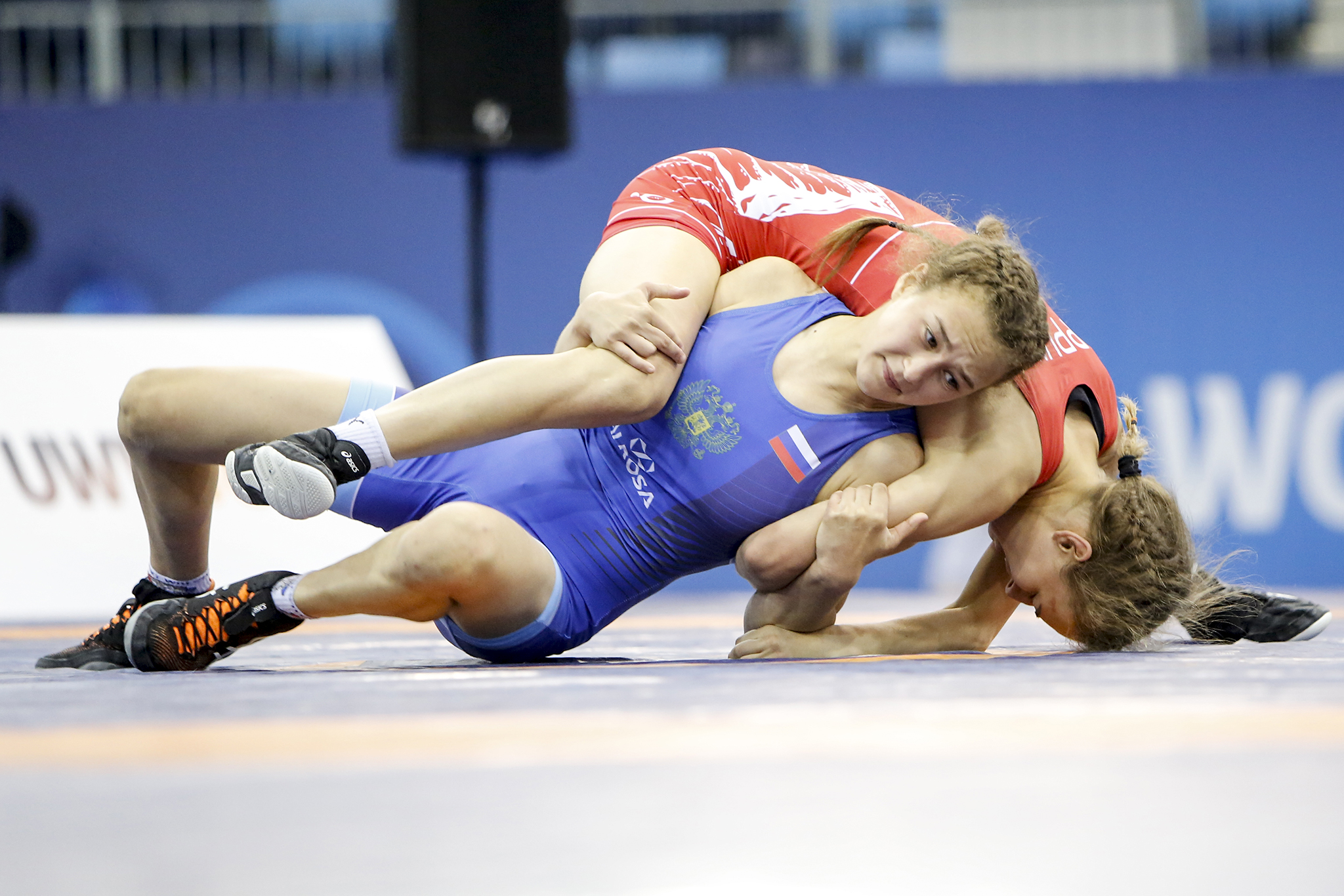Susaki Secures Olympic Spot as Japan, China Fill Missing Women's Berths
Saturday, April 10, 2021 - 10:32 By Ken Marantz

AL:MATY, Kazakhstan (April 10) -- After waiting a year for her chance to qualify for the Tokyo Olympics, two-time world champion Yui SUSAKI (JPN) needed just over six minutes over three matches to secure the coveted spot.
Susaki won all three of her round-robin matches by technical fall in the women's 50kg class, assuring a top-two finish going into her final match to be held at the night session of Asian Olympic qualifying tournament on Saturday.
"Getting here was a long, tough road," Susaki said. "Really, it was because of the support and cooperation from a lot of people that I am here now."
Having achieved her primary goal of taking home an Olympic ticket from the Baluan Sholak Palace of Culture and Sports in Almaty, Susaki will now aim to add the 50kg title when she faces Namuuntsetseg TSOGT OCHIR (MGL) in the de facto gold-medal match.
Tsogt Ochir also won all of her three matches inside the distance to set up a showdown for bragging rights with Susaki in the fifth round of matches.
The 50kg class was the only one that Japan did not secure an Olympic spot at the 2019 World Championships in Nursultan. With Susaki's performance, the Olympic host will now be sending a full slate of six wrestlers in the women's competition.
China will also have a presence in all six weight classes after filling the two slots it had missed out on in Nursultan, with Jia LONG (CHN) advancing to the semifinals at 62kg and Feng ZHOU (CHN) doing likewise at 68kg, although the latter had some bumps along the way.
Because the Asian nations secured so many women's Olympic berths at the Nursultan worlds -- a total of 16 -- all weight classes in Almaty had no more than seven entries and were competed using preliminary groups. The 50kg and 76kg have only five entries each, meaning a straight round-robin competition without semifinals or finals.
Mongolia, which gained just one Olympic spot in Nursultan, picked up three more, and could add another depending on how Burmaa OCHIRBAT (MGL) fares in her final match at 76kg. India and Uzbekistan could also gain a place.
At this point, India and Kyrgyzstan have both clinched two berths each, while host Kazakhstan gained one through an inspired performance from veteran Tatyana AKHMETOVA AMANZHOL (KAZ), who will be returning to the Olympics after a 13-year absence.
Susaki had missed the 2019 World Championships after losing out on a place on the Japan team to rival Yuki IRIE (JPN), who remains the only wrestler on the planet to have defeated the 21-year-old. But when Irie failed to finish among the top six, it reopened the door to the Tokyo Games for Susaki.
She did not waste the opportunity, and avenged the loss the Irie at the 2019 All-Japan Championships to earn a ticket to the Asian Olympic qualifier. When the coronavirus pandemic hit the world, she along with the rest of the sporting world had to endure delays and postponements.
"I went through hard times when all hope had been lost about going to the Olympics," Susaki said. "It was very difficult. But going through that experience made me stronger."
Susaki started her campaign with a 50-second 10-0 technical fall over Dauletbike YAKHSHIMURATOVA (UZB), then followed that an 11-0 technical fall in 1:55 over Miran CHEON (KOR). In the latter, she mixed things up a bit by adding a gut wrench to her trademark lace lock.
The berth at the Olympics -- where the wrestling competition will be held in her native Chiba Prefecture --became hers with a no-messing-around 10-0 technical fall over Seema SEEMA (IND) in 3:25. The only reason the match lasted so long was that Susaki spent the latter half of the first period trying gain a fall with a leg lock and crossface hold before time ran out.
In the 68kg semifinals, Zhou, a 2018 world bronze medalist, gave up an early takedown to Hyeonyeong PARK (KOR), but stormed back with a pair of 4-point moves to win 12-2 technical fall in 3:32.
In the final, Zhou faces a rematch with Meerim ZHUMANAZAROVA (KGZ), whom she defeated in their group match 7-5. In that match, Zhou trailed 5-1 with a minute left, then having cut the lead to 5-3, used a front headlock roll to score four points in the final 10 seconds.
Zhou was not in much of a mood to talk about her performance, only that she expects to do better in Tokyo. "I don't want to say anything," she said. "I will win the gold in Tokyo. That's it. Nothing else.
"I don't feel I expressed myself completely in this competition. But I think I can do better."
Zhumanazarova gained her Olympic place and advanced to the final after also spotting her opponent a lead, rebounding from a 3-0 deficit to defeat Nisha NISHA (IND) by 13-3 technical fall in 4:15. After tying the match at the end of the first period, Zhumanazarova gained a takedown then finished the match with four lock-lace rolls.
China's Long, who finished third at the 2020 Matteo Pellicone Tournament, used a slick ankle pick to pick apart 2014 world champion Tserenchimed SUKHEE (MGL) in their 62kg semifinal, scoring a 10-0 technical fall in 4:27.
Long will also have a rematch in the final, but against an opponent who had defeated her earlier in the day. Young Sonam SONAM (IND), who beat Long 5-2, clinched her Olympic ticket by rebounding from a 6-0 deficit to forge out a 9-6 win over plucky Asian silver medalist Ayaulym KASSYMOVA (KAZ).
"The Kazakh girl was a very good wrestler and I was trailing 0-6, but I was confident of winning even after that," said Sonam, the 2019 world cadet champion. "This is incredible."
Sonam said that qualifying along with teammate Anshu ANSHU (IND), who made the final at 57kg, makes it all the more special.
"I train with Anshu, she is my partner and to qualify with her is great," Sonam said. "One of the best feelings."
For Anshu, her biggest battle might have been the one with the scale. She won all three of her matches by technical fall, capped by a 12-2 rout of Shokhida AKHMEDOVA (UZB).
"I was above weight and we reached Almaty just seven hours before weigh-in," Anshu said. "I was running at the airport in Tashkent to reduce weight. I just wanted to do it, qualify myself for Tokyo."
Her opponent in the final, Khongorzul BOLDSAIKHAN (MGL), was equally dominant, as her 10-0 victory over Jieun UM (KOR) was her third technical fall of the day as well.
The award for gutsiet performance must go to Akhmetova Amanzhol, who endured a painful knee made worse in the semifinal to forge out an 11-1 technical fall over Hyungjoo KIM (KOR).
"When the bout finished, I was only thinking about going to Tokyo," Akhmetova Amanzhol said.
In the final, she will have a rematch of the most exciting bout of the day with Bolortuya BAT OCHIR (MGL), who advanced with a quick fall over Meng Hsuan HSIEH (TPE).
In their group match, Bat Ochir led 8-1 when Akhmetova Amanzhol pancaked her onto her back for 4 points, and the Mongoila was only saved by the buzzer that ended the first period.
In the second period, the Kazakh went ahead 9-8 with a nifty 4-point back trip with Bat Ochir holding her leg in the air. With :02 left, Bat Ochir received 1 point for a stepout, then lost a challenge to have it revised to a takedown to give Akhmetova Amanzhol a 10-9 victory.
Akhmetova, now 35, will be returning to the Olympics for the first time since appearing at Beijing 2008, where she placed fifth at 48kg.
She showed she was still a force to be reckoned with at last year's Asian Championships, where she stunned two-time world champion Mayu MUKAIDA (JPN) in the final for her third Asian gold and first since 2014.
Women's wrestling results
50kg
Group Standings (through 4 rounds)
1. Namuuntsetseg TSOGT OCHIR (MGL) 3-0 (13 pts); 2. Yui SUSAKI (JPN) 3-0 (12 pts); 3. Dauletbike YAKHSHIMURATOVA (UZB) 2-2 (8 pts); 4. Seema SEEMA (IND) 0-3 (1 pt); 5. Miran CHEON (KOR) 0-3 (1 pt).
Tsogt Ochir and Susaki clinch top two spots.
53kg
Semifinals
Tatyana AKHMETOVA AMANZHOL (KAZ) df. Hyungjoo KIM (KOR) by TF, 11-1, 6:00
Bolortuya BAT OCHIR (MGL) df. Meng Hsuan HSIEH (TPE) by Fall, 1:16 (2-0)
57kg
Semifinals
Anshu ANSHU (IND) df. Shokhida AKHMEDOVA (UZB) by TF, 12-2, 3:20
Khongorzul BOLDSAIKHAN (MGL) df. Jieun UM (KOR) by TF, 10-0, 1:52
62kg
Semifinals
Jia LONG (CHN) df. Tserenchimed SUKHEE (MGL) by TF, 10-0, 4:27
Sonam SONAM (IND) df. Ayaulym KASSYMOVA (KAZ), 9-6
68kg
Semifinals
Meerim ZHUMANAZAROVA (KGZ) df. Nisha NISHA (IND) by TF, 13-3, 4:15
Feng ZHOU (CHN) df. Hyeonyeong PARK (KOR) by TF, 12-2, 3:32
76kg
Group Standings (through 4 rounds)
1. Aiperi MEDET KYZY (KGZ) 4-0 (16 pts); 2. Burmaa OCHIRBAT (MGL) 2-1 (6 pts); 3. Pooja POOJA (IND) 1-2 (6 pts); 4. Shakhribonu ELLIEVA (UZB) 1-2 (5 pts); 5. Seoyeon JEONG (KOR) 0-3 (2 pts).
Medet Kyzy clinches first place.



Share your thoughts.
Comments